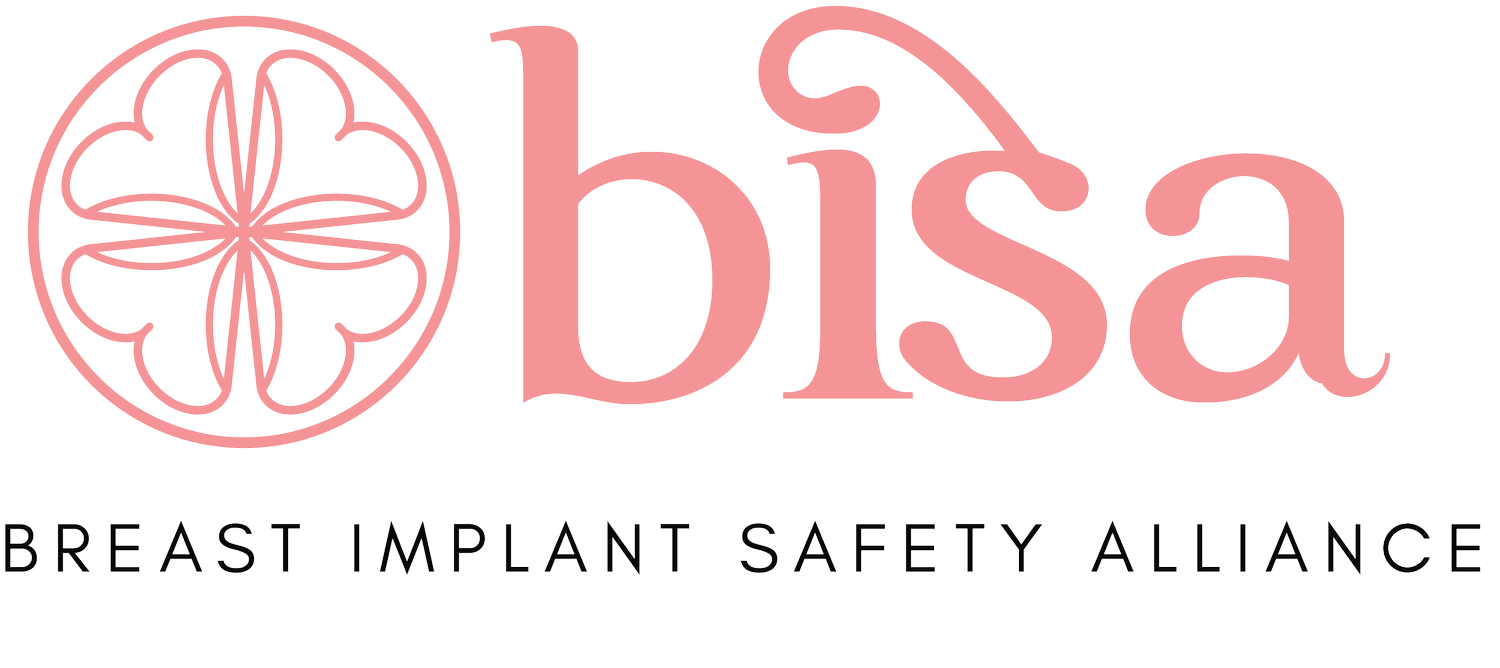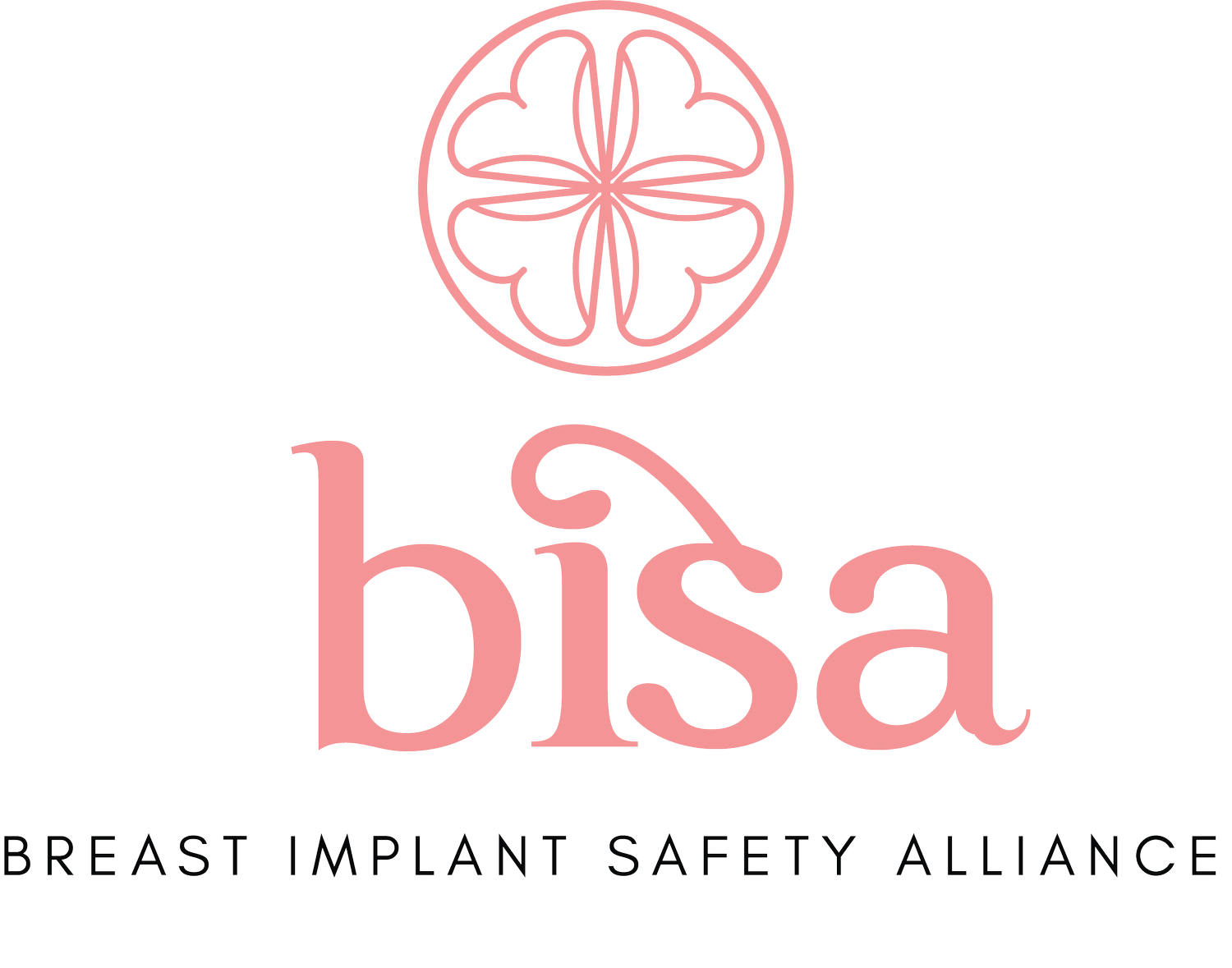BISA Statement: FDA Reports of New Cancers in Capsule Around Breast Implants
The U.S. Food and Drug Administration (FDA) released a safety communication informing the public about reports of newly-discovered types of cancer in the capsules around breast implants. The cancers, found in the scar-tissue capsule that forms around breast implants, have been discovered in patients with textured and smooth breast implants, and for both saline and silicone-filled breast implants.
Published on Thursday, Sept. 8, 2022, the announcement Breast Implants: Reports of Squamous Cell Carcinoma and Various Lymphomas in Capsule Around Implants invites more questions than answers.
The Breast Implant Safety Alliance (BISA), known as BISA, is a patient-centered organization dedicated to improving breast implant safety—through direct collaboration with consumers, plastic surgeons, manufacturers, regulators, and advocates.
After the announcement, BISA met with the FDA and the American Society of Plastic Surgeons (ASPS) to discuss the developing issue. Our official statement aims to improve consumer knowledge, increase healthcare professionals' surgeon awareness, and provide recommendations to increase patient safety.
What is squamous cell carcinoma? Are SCC and other lymphomas rare?
The FDA identified less than 50 cases of SCC and other lymphomas in published literature, and the agency received 22 medical device reports (MDRs) as of Sept. 1.
Squamous cell carcinoma (SCC) is not breast cancer or breast-implant-associated anaplastic lymphoma (BIA-ALCL), which is a cancer of the immune system. Reported signs and symptoms included swelling, pain, lumps, or skin changes. In some cases, people were diagnosed after years of having breast implants. Risk factors for SCC and the various lymphomas are currently unknown.
At this time, the FDA announcement indicated the agency believes cases of SCC and other lymphomas in scar tissue around the capsule may be rare. Though cases seem to be or ‘are reported to be’ rare, they’re very serious. Patients experiencing symptoms should self-report to the FDA Medwatch program. Currently, reporting problems to the FDA is not mandatory for healthcare practitioners, doctors, or patients.
The data is limited. It’s essential to recognize the issue is emerging, and the FDA’s understanding of new cancers related to breast implants is evolving.
BISA Response & Recommendations
Though the FDA safety communication is constructive, patient advocates have been raising concerns about cancers associated with breast implants. Collecting and sharing the information for years, patient advocates have been communicating on message boards and other websites, even before Facebook:
Breast Implant Associated Cancers & Complications on Facebook Pages
*Created by patients and advocates, shared in 2020
Breast implant Associated Squamous Cell Carcinoma
*Public page was created on January 7, 2020
Scar Capsules . . complications and cancers
*Public page was created on December 13, 2017
Breast Implants And Cancers, Medical Case Reports And More
*Public page was created on June 7, 2017
The public might have been alerted earlier if the FDA enforced the original and agreed-upon requirement of the post-market studies. Had the post-approval studies started in 1992 and again in 2002 been continued and patients followed for symptoms, the public would have better data and information.
This was a missed opportunity that directly impacts patient safety today. Additionally, organizations may have benefited from receiving the safety communication with reasonable advance notice to better prepare for the influx of patient questions and concerns.
Recognizing additional breast implant-related cancers is a step in the right direction, and BISA looks forward to the agency’s commitment to further investigation.
In the interim, BISA recommends the following steps:
Update the informed consent checklist, labeling requirements, and Black Box Warning with the newly identified risk of cancers.
Enforce the use of unique device identifiers (UDIs) for better identification and recall notification when necessary.
Engage in collaboration with various medical societies, along with plastic surgery, to foster diverse thinking and avoid potential conflicts of interest.
Improve communication with the public and healthcare professionals; many patients visit their primary care doctor first, not the plastic surgeon.
Test scar tissue properly.
Make reporting into PROFILE, FDA MedWatch, and NBIR mandatory to ensure information and transparency.
Increase enforcement actions against those manufacturers that violate current medical device regulations.
ASPS Statement & Update
ASPS contacted BISA to collaborate on patient safety efforts related to the recent FDA communication. The society provided the following updates:
The ASPS statement on Breast Implant Associated-Squamous Cell Carcinoma (BIA-SCC); intended for medical professionals, includes ASPS/PSF (Plastic Surgery Foundation) recommendations.
An update to the ASPS website page—Breast Implant Safety: What Patients Need to Know.
Our Commitment to Collaboration
The FDA and the ASPS have remained in continuous communication with BISA; both are open to finding ways to assist the breast implant and explant community.
BISA is patient-focused—patients' rights and dignity come first. We believe in unbiased education and science-backed information. Collaboration is a core value, and we’re committed to creating opportunities for patients, advocates, medical professionals, policy experts, and industry to come together and find solutions.
BISA is available to address any concerns raised at upcoming stakeholder meetings and conferences. If you have questions or concerns, please contact Maria Gmitro at maria@bisanonprofit.org.


